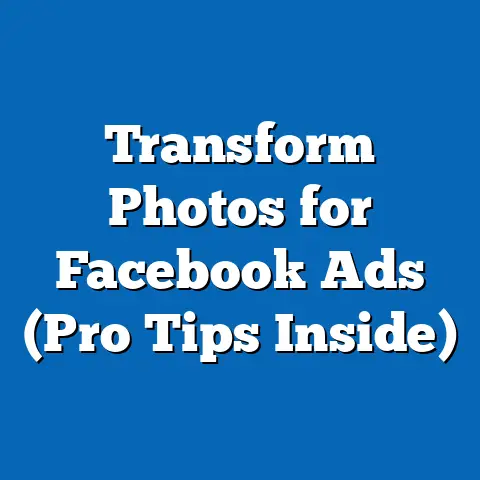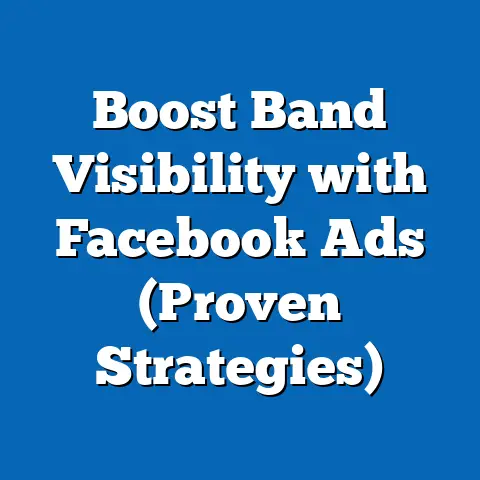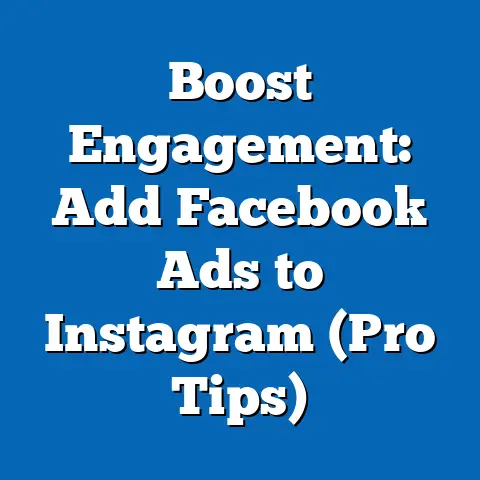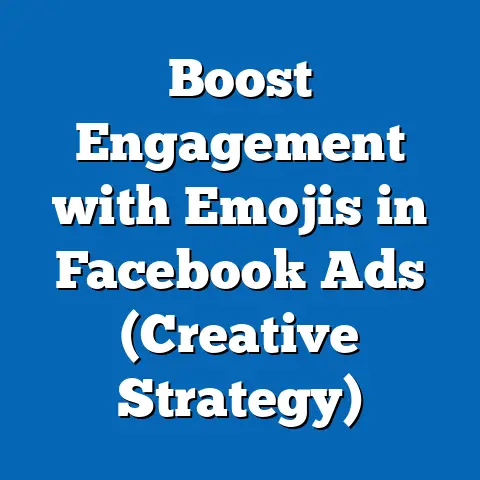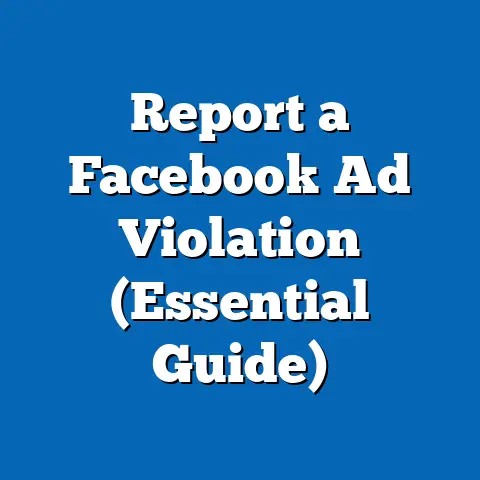Why Advertisers Pull Facebook Ads (Insightful Analysis)
In today’s world, where consumers are increasingly conscious of the impact their choices have on the environment and society, sustainability isn’t just a buzzword—it’s a driving force. We’re seeing a significant shift in consumer behavior, with more and more people actively seeking out brands that align with their values. For businesses, this means that sustainability is no longer a nice-to-have; it’s a critical component of their overall strategy. This extends to advertising, where platforms like Facebook, with their massive reach and influence, are under intense scrutiny. I’ve noticed a growing trend of advertisers pulling their ads from Facebook, and it’s not always about ad performance. It’s often rooted in a deeper concern about the platform’s practices and policies. This article delves into the multifaceted reasons behind this phenomenon, exploring the intersection of sustainability, corporate responsibility, and the evolving landscape of digital advertising.
The Evolution of Facebook as an Advertising Platform
To understand why some advertisers are choosing to leave Facebook, it’s essential to understand how the platform has evolved into the advertising behemoth it is today.
Historical Context
Facebook’s journey from a Harvard dorm room project to a global advertising powerhouse is nothing short of remarkable. In its early days, Facebook focused primarily on connecting people. However, as its user base exploded, the potential for advertising became undeniable. Facebook started experimenting with different ad formats, gradually building its advertising infrastructure. This evolution was strategic, transforming Facebook from a social network into a sophisticated marketing platform. I remember when Facebook ads were simple banner ads with limited targeting. Now, it’s a complex ecosystem with advanced capabilities.
User Base and Engagement
Facebook’s appeal to advertisers lies in its sheer size and the level of engagement it commands. With billions of active users worldwide, Facebook offers unparalleled reach. This massive user base is not just passively present; they’re actively engaging with content, sharing updates, and interacting with brands. The platform’s ability to capture and analyze this engagement data is a goldmine for advertisers. It allows them to target specific demographics, interests, and behaviors, making their campaigns more effective. I’ve personally seen campaigns targeting niche interests achieve significantly higher engagement rates compared to broad demographic targeting.
Ad Formats and Targeting Capabilities
One of Facebook’s strengths is its diverse range of ad formats, catering to different marketing objectives. From simple image ads to immersive video ads and interactive carousel ads, Facebook provides options for every brand. The platform’s targeting capabilities are equally impressive. Advertisers can target users based on age, gender, location, interests, behaviors, and even custom audiences derived from their own customer data. This level of granularity allows for highly personalized and effective advertising campaigns. I once ran a campaign targeting users who had recently purchased a competitor’s product, and the results were phenomenal.
Takeaway: Facebook’s evolution into a sophisticated advertising platform has made it a powerful tool for marketers. Its massive user base, diverse ad formats, and advanced targeting capabilities are key reasons why it remains a dominant player in the digital advertising landscape.
Reasons for Pulling Ads
Despite its strengths, Facebook is facing increasing scrutiny, leading some advertisers to pull their ads. These reasons range from ad performance issues to concerns about brand safety and data privacy.
Ad Performance Issues
While Facebook offers powerful targeting capabilities, not every campaign is a success story. Many advertisers struggle with low engagement rates, high costs, and ineffective targeting. These performance issues can be frustrating, leading them to question the value of advertising on the platform. Factors such as ad fatigue, poor creative execution, and ineffective bidding strategies can all contribute to poor ad performance. I’ve seen cases where simply refreshing the ad creative or refining the targeting parameters can dramatically improve results.
Brand Safety Concerns
Brand safety is a major concern for advertisers. The presence of controversial content, hate speech, and misinformation on Facebook poses a significant risk to brand reputation. Advertisers don’t want their ads appearing alongside content that could damage their brand image. Facebook has made efforts to address these issues, but the sheer volume of content makes it a constant challenge. I remember a brand pulling its ads after they appeared next to a post promoting hate speech, highlighting the immediate and tangible impact of brand safety concerns.
Platform Policies and Algorithm Changes
Facebook’s advertising policies and algorithms are constantly evolving. While these changes are often intended to improve user experience and ad relevance, they can also create headaches for advertisers. Frequent changes can disrupt carefully planned campaigns, requiring advertisers to adapt quickly or risk a decline in performance. The lack of transparency around algorithm changes can also be frustrating, making it difficult for advertisers to understand why their ads are performing poorly. I’ve experienced firsthand the frustration of having a successful campaign suddenly tank after an algorithm update.
Data Privacy Issues
The Cambridge Analytica scandal brought data privacy to the forefront of public consciousness. The revelation that user data was harvested without consent and used for political advertising sparked widespread outrage and led to increased scrutiny of Facebook’s data practices. Advertisers are now more aware of the risks associated with data privacy and are taking steps to protect themselves and their customers. Some advertisers have chosen to reduce their reliance on Facebook advertising due to concerns about data privacy and the potential for future scandals. I’ve seen brands shift their focus to privacy-focused advertising platforms as a result of these concerns.
Takeaway: Advertisers pull their ads from Facebook for a variety of reasons, including ad performance issues, brand safety concerns, frequent policy and algorithm changes, and data privacy issues. These factors highlight the challenges and risks associated with advertising on the platform.
The Impact of Social Movements and Consumer Sentiment
Social movements and changing consumer sentiment are also playing a significant role in advertisers’ decisions to pull their ads from Facebook.
Consumer Backlash
Brands that are perceived to be associated with Facebook during times of social unrest or controversy often face consumer backlash. This can take the form of boycotts, negative reviews, and social media campaigns calling for companies to distance themselves from the platform. The Black Lives Matter movement, for example, led to calls for companies to boycott Facebook due to its handling of hate speech and misinformation. Brands that continued to advertise on Facebook during this time faced criticism and reputational damage. I’ve seen brands lose significant market share due to their perceived association with controversial platforms.
Corporate Responsibility
Consumers are increasingly holding advertisers accountable for their actions and the platforms they choose to advertise on. They expect brands to align with their values and to take a stand on important social and environmental issues. This means that advertisers can no longer afford to be neutral. They must actively demonstrate their commitment to corporate responsibility and ethical marketing practices. Advertising on platforms that are perceived to be unethical or harmful can damage a brand’s reputation and alienate customers. I’ve seen brands invest heavily in sustainability initiatives only to have their efforts undermined by their association with controversial advertising platforms.
The Shift to Ethical Marketing
Ethical marketing is becoming increasingly important in today’s world. Consumers are more likely to support brands that are transparent, honest, and committed to social and environmental responsibility. This means that advertisers must carefully consider the ethical implications of their marketing campaigns and the platforms they choose to advertise on. Advertising on platforms that are perceived to be unethical or harmful can undermine a brand’s ethical marketing efforts. I’ve seen brands prioritize ethical marketing practices, including choosing advertising platforms that align with their values.
Takeaway: Social movements and changing consumer sentiment are influencing advertisers’ decisions regarding where to allocate their ad spend. Consumers are holding brands accountable for their actions and the platforms they choose to advertise on, leading to a shift towards ethical marketing practices.
Financial Considerations
Beyond ethical concerns, financial considerations also play a role in advertisers’ decisions to pull their ads from Facebook.
Cost-Benefit Analysis
Advertising on Facebook can be expensive, and advertisers need to carefully analyze the cost-benefit ratio. They need to consider the cost of running ads, the potential return on investment (ROI), and the opportunity cost of advertising on other platforms. If the cost of advertising on Facebook is too high relative to the potential benefits, advertisers may choose to withdraw their ads and allocate their budget elsewhere. I’ve seen brands conduct rigorous ROI analyses that revealed that Facebook advertising was not as cost-effective as other marketing channels.
Bidding Wars and Ad Fatigue
The competitive nature of bidding for ad space on Facebook can drive up costs. Advertisers are constantly competing with each other to reach the same audience, leading to bidding wars that can significantly increase ad prices. Ad fatigue can also impact performance, as users become less responsive to ads they’ve seen repeatedly. This means that advertisers need to constantly refresh their ad creative and targeting parameters to maintain engagement. I’ve seen brands struggle to maintain consistent performance on Facebook due to bidding wars and ad fatigue.
Alternative Platforms
The rise of alternative advertising platforms is also influencing advertisers’ decisions. Platforms like TikTok, LinkedIn, and Amazon offer different targeting capabilities and ad formats, catering to specific marketing objectives. Some advertisers have found that these alternative platforms offer better ROI and more effective targeting compared to Facebook. The increasing availability of privacy-focused advertising platforms is also attracting advertisers who are concerned about data privacy. I’ve seen brands diversify their advertising spend across multiple platforms to mitigate risk and maximize ROI.
Takeaway: Financial considerations, including cost-benefit analysis, bidding wars, ad fatigue, and the availability of alternative platforms, are influencing advertisers’ decisions to pull their ads from Facebook.
The Role of Stakeholder Pressure
Stakeholder pressure from investors, employees, and partners is also playing a role in advertisers’ decisions to pull their ads from Facebook.
Investor Expectations
Investors are increasingly scrutinizing companies’ ethical practices and sustainability initiatives. They expect companies to align with their values and to take a stand on important social and environmental issues. This means that companies are under pressure to avoid advertising on platforms that are perceived to be unethical or harmful. Investors may divest from companies that continue to advertise on such platforms, leading to a decline in stock value. I’ve seen companies face pressure from investors to reduce their reliance on controversial advertising platforms.
Employee Advocacy
Employees are also becoming more vocal about their companies’ ethical practices and sustainability initiatives. They expect their employers to align with their values and to take a stand on important social and environmental issues. Employees may publicly criticize companies that continue to advertise on platforms that are perceived to be unethical or harmful. This can damage a company’s reputation and morale. I’ve seen employees organize petitions and social media campaigns calling for their companies to distance themselves from controversial advertising platforms.
Partnerships and Collaborations
Partnerships with other brands or organizations that focus on sustainability can also compel advertisers to withdraw from Facebook in favor of more aligned platforms. These partnerships often require companies to adhere to certain ethical standards and sustainability practices. Advertising on platforms that are perceived to be unethical or harmful can undermine these partnerships. I’ve seen companies terminate advertising relationships with Facebook to maintain their partnerships with sustainability-focused organizations.
Takeaway: Stakeholder pressure from investors, employees, and partners is influencing advertisers’ decisions to pull their ads from Facebook. These stakeholders expect companies to align with their values and to take a stand on important social and environmental issues.
The Future of Facebook Advertising
The future of Facebook advertising is uncertain. The platform faces numerous challenges, including increasing competition, changing consumer sentiment, and growing regulatory scrutiny.
Trends and Predictions
Several trends are likely to shape the future of Facebook advertising. These include:
- Increased focus on privacy: Consumers are becoming more concerned about data privacy, and Facebook will need to adapt to meet these demands. This may involve implementing new privacy features and providing users with more control over their data.
- Shift towards ethical marketing: Advertisers will need to prioritize ethical marketing practices and choose advertising platforms that align with their values. This may involve reducing their reliance on Facebook and exploring alternative platforms.
- Growing regulatory scrutiny: Governments around the world are increasing their scrutiny of social media platforms, and Facebook is likely to face greater regulatory oversight in the future. This may involve new regulations regarding data privacy, content moderation, and advertising practices.
- Rise of alternative platforms: Alternative advertising platforms are likely to continue to gain market share, offering advertisers more options and greater flexibility.
Facebook’s Response
Facebook has responded to these challenges by implementing new policies, ad formats, and community standards. These include:
- Enhanced privacy features: Facebook has introduced new privacy features, such as the Privacy Checkup tool, to give users more control over their data.
- Improved content moderation: Facebook has invested in improving its content moderation capabilities to combat hate speech, misinformation, and other harmful content.
- New ad formats: Facebook has introduced new ad formats, such as augmented reality ads, to provide more engaging and immersive experiences for users.
- Partnerships with fact-checkers: Facebook has partnered with fact-checkers to identify and label misinformation on the platform.
The Role of Regulation
Future regulations are likely to have a significant impact on social media advertising. Governments around the world are considering new regulations regarding data privacy, content moderation, and advertising practices. These regulations could significantly alter the landscape of social media advertising, potentially limiting the ability of platforms like Facebook to collect and use user data.
Takeaway: The future of Facebook advertising is uncertain, but several trends are likely to shape its evolution. These include increased focus on privacy, a shift towards ethical marketing, growing regulatory scrutiny, and the rise of alternative platforms. Facebook is responding to these challenges by implementing new policies, ad formats, and community standards.
Conclusion: Navigating the Complex Landscape of Advertising on Facebook
In conclusion, the decision to pull ads from Facebook is a complex one, influenced by a variety of factors. Ad performance issues, brand safety concerns, platform policies, data privacy, social movements, consumer sentiment, financial considerations, and stakeholder pressure all play a role. Understanding the interplay between these factors is crucial for navigating the complex landscape of advertising on Facebook.
As consumers become more conscious of the impact their choices have on the environment and society, advertisers must prioritize ethical marketing practices and choose advertising platforms that align with their values. This may involve reducing their reliance on Facebook and exploring alternative platforms that offer better ROI, more effective targeting, and greater alignment with their ethical principles.
The future of advertising is increasingly intertwined with sustainability and ethical practices. Advertisers who embrace these values are more likely to succeed in the long run, building stronger relationships with customers and contributing to a more sustainable and equitable world.
Ultimately, the decision to advertise on Facebook is a strategic one that requires careful consideration of all relevant factors. Advertisers must weigh the potential benefits against the risks and make a decision that aligns with their values, their business objectives, and the expectations of their stakeholders. The days of blindly pouring money into Facebook ads are over. We’re entering an era of conscious advertising, where every dollar spent is a reflection of a brand’s commitment to a better future.

